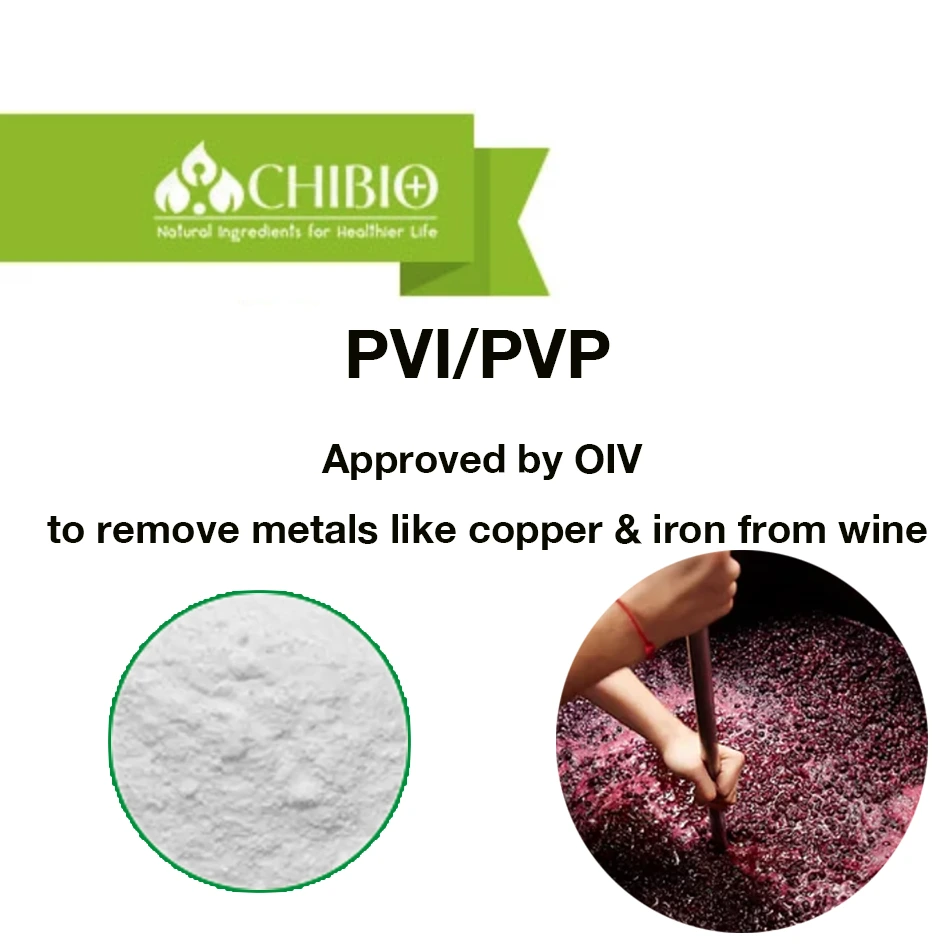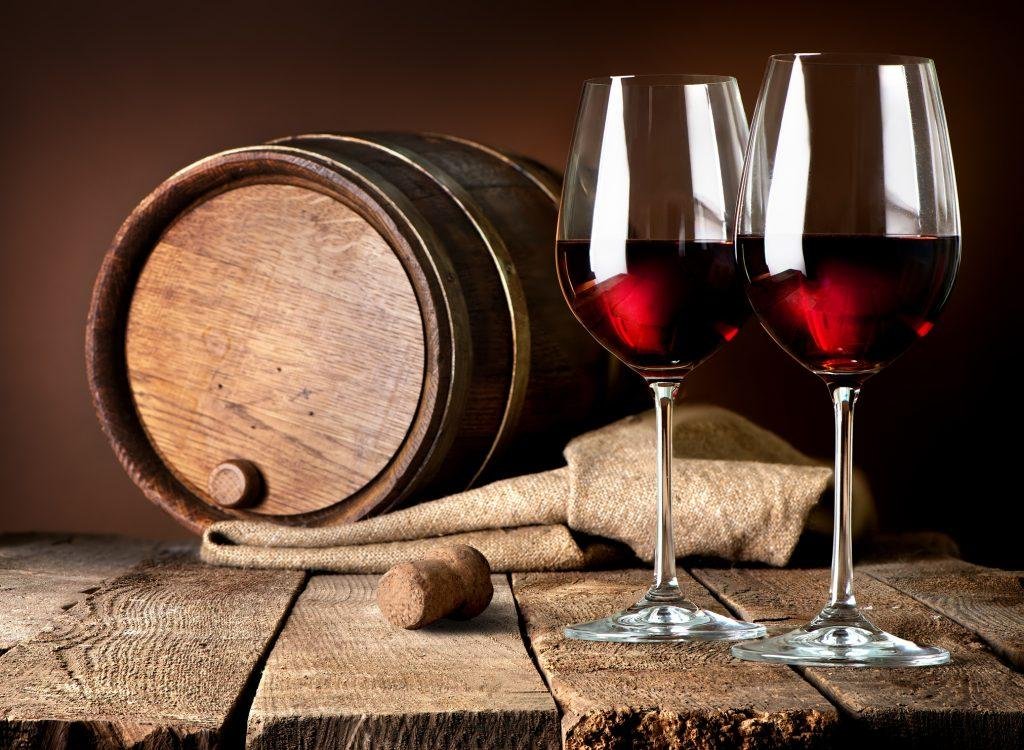Polyvinylimidazole-Polyvinylpyrrolidone Copolymers (PVI/PVP)
Polyvinylimidazole-Polyvinylpyrrolidone Copolymers (PVI/PVP)
Additional information
| Product Name | Polyvinylimidazole-Polyvinylpyrrolidone Copolymers (PVI/PVP) |
|---|---|
| Form | White to cream, slightly hygroscopic powder |
| Solubility | Insoluble in water but swells in acidic solutions, making it ideal for metal ion absorption. |
| Cas No. | 87865-40-5 |
| Spec | PVI:PVP=9:1 |
| Grade | Food Grade Complied with International Oenological Codex |
| Main Applications | Approved by the International Organisation of Vine and Wine (OIV) and is primarily used for removing metals like copper and iron from wine. |
Product Details
Polyvinylimidazole-Polyvinylpyrrolidone Copolymers (PVI/PVP): A Game-Changer for the Wine Industry
 What are Polyvinylimidazole-Polyvinylpyrrolidone Copolymers (PVI/PVP)?
What are Polyvinylimidazole-Polyvinylpyrrolidone Copolymers (PVI/PVP)?
Polyvinylimidazole-Polyvinylpyrrolidone copolymers (PVI/PVP) are advanced, high-performance polymers created by combining polyvinylimidazole (PVI) and polyvinylpyrrolidone (PVP). These copolymers are renowned for their ability to bind heavy metals, making them highly effective in winemaking.
PVI/PVP is approved by the International Organisation of Vine and Wine (OIV) and is primarily used for removing metals like copper and iron from wine, ensuring better quality and clarity.
Adsorbent copolymers of PVI/PVP are insoluble and slightly-hygroscopic powders. They are manufactured by “popcorn” polymerization of N-vinylimidazole (CAS no. 1072-63-5,) and N-vinyl-2-pyrrolidone (CAS no. 88-12-0,), with a ratio of 9:1. N,N ́- divinylimidazolidin-2-one (CAS no. 13811-50,) is used as crosslinking agent at a level of less than 2% by weight of the total amount of the monomers.
CAS No.: 87865-40-5
Synonyms: Terpolymer of 1-vinylimidazole, 1-vinylpyrrolidone, and 1,3-divinylimidazolidinone. Cross-linked copolymer of vinylimidazole/vinylpyrrolidone.
Benefits and Functions of PVI/PVP in Winemaking
- Metal Ion Removal: PVI/PVP binds with heavy metals like iron and copper, preventing oxidation and preserving the quality of wine.
- Stability and Clarity: It ensures that the wine remains clear and stable by preventing oxidation and haze formation.
- Non-toxic and Safe: PVI/PVP is safe for use in the wine industry and complies with international safety standards.
Specifications of PVI/PVP
- Form: White to cream, slightly hygroscopic powder.
- Molecular Weight: Ranges between 2,000 to 600,000 Da.
- Solubility: Insoluble in water but swells in acidic solutions, making it ideal for metal ion absorption.
- Purity: Meets stringent safety standards for food-grade applications.
| Product Name | Polyvinylimidazole/ Polyvinylpyrrolidone (PVI/PVP) |
| Ratio | PVI:PVP=9:1 |
| Grade | Food Grade Complied with International Oenological Codex |
| Cas No.# | 87865-40-5 |
|
Test ltem |
Specification |
| Appearance | white to cream, slightly hygroscopic powder |
| Solubility | Practically insoluble in all the present solvents |
| N,N-Divinylimidazolidionon | ≤2 ppm |
| N-Vinylimidazol | ≤10ppm |
| Vinylpyrrolidinone (lmpurity A) | ≤5ppm |
| Nitrogen | 26.0% – 29.0% |
| Water (Karl-Fischer) | ≤5.0% |
| Solubility in acetic acid /ethanol | ≤1% |
| Water soluble substances | ≤0.5% |
| Ash (6 h,800℃) | ≤0.02% |
| Heavy metals as Pb | ≤2mg/kg |
| Arsenic (As) | ≤2mg/kg |
| Mercury(Hg) | ≤1mg/kg |
| Zinc(Zn) | ≤1mg/kg |
| Cadmium(Cd) | ≤1mg/kg |
| Cuprum(Cu) | ≤1mg/kg |
| lron(Fe) | ≤5mg/kg |
| Microbiological Status | |
| Aerobic plate count | ≤100 cfu/g |
| Mold & yeast | ≤100 cfu/g |
| Escherichia Coli | Negative/g |
| Pseudomonas aeruginosa | Negative/g |
| Salmonella | Negative/10g |
| Staphylococcus aureus | Negative/g |
| Inspection conclusion:Product complies with the International Oenological Codex qualitystandard。 | |
| Quality Guarantee:3 years, stored in a sealed container at room temperature | |
Main Application: Wine Industry
Winemaking is the primary approved application of PVI/PVP copolymers. It is used as a clarifying and stabilizing agent to remove excess metals like iron and copper, which can cause oxidation and affect the quality of the wine. This ensures better clarity, stability, and taste in the final product.
Potential Future Applications
While PVI/PVP is primarily used in winemaking, ongoing research is exploring its potential applications in other industries such as cosmetics, pharmaceuticals, water treatment, and food processing. However, these applications are still in development and have not yet been widely approved.
How PVI/PVP Works
PVI/PVP binds selectively with metal ions like copper and iron. When added to a solution, the PVI component binds with the metal ions, forming complexes that can be easily filtered out. The PVP component stabilizes the polymer, ensuring consistent performance.
Dosage Guideline for Winemaking
The recommended dosage for wine clarification typically ranges from 10-50 mg/L, depending on the concentration of metals in the wine.
Adsorbent copolymers of PVI/PVP are added to must or wine in accordance with the files described in the Code of Oenological Practices of the OIV in amounts of less than 500 mg/l.
Adsorbent copolymers of PVI/PVP can be added to must or wine in order to prevent the defects caused by excessive metal contents or to reduce undesirably-high metal concentrations.
The must or wine must be filtered through a filter media with pores whose diameter is no greater than 3 microns and with a filtration pressure no greater than 0.8 bars.
Production Flowchart
At Chibio Biotech, our PVI/PVP copolymer production follows a rigorous process to ensure the highest quality standards:
-
- Monomer Sourcing: We source high-purity polyvinylimidazole and polyvinylpyrrolidone from trusted suppliers.
- Polymerization: The monomers are chemically combined in a controlled environment to create the copolymer.
- Purification: The PVI/PVP copolymer undergoes thorough purification to remove any impurities.
- Quality Control: Rigorous testing ensures the product meets all specifications, including heavy metal content and nitrogen levels.
- Packaging: The final product is carefully packaged in moisture-proof containers for shipment.
Why Choose Chibio Biotech?
At Chibio Biotech, we specialize in the development of high-quality PVI/PVP copolymers for the wine industry. Here’s why you should partner with us:
- Expertise: Over 12 years of experience in the development and production of advanced polymers.
- Quality Assurance: Our PVI/PVP products are manufactured in ISO and KOSHER certified facilities.
- Innovation: We stay at the forefront of polymer research, ensuring that our products meet the latest industry standards.
- Global Reach: Trusted by top winemakers worldwide.
Why Use PVI/PVP in Your Business?
Incorporating Polyvinylimidazole-Polyvinylpyrrolidone copolymers (PVI/PVP) into your business operations can enhance product quality, improve safety, and optimize your processes. Whether you’re looking to stabilize wine, improve water purification, or create more effective cosmetic formulations, PVI/PVP is the solution you’ve been searching for.
PVI/PVP copolymers are gaining traction across industries because of their versatility, cost-effectiveness, and superior performance. Choosing the right partner for your PVI/PVP needs is essential, and Chibio Biotech is the trusted name in the field.
Send Us Your Inquiry Today!
Looking to improve your wine production with the power of Polyvinylimidazole-Polyvinylpyrrolidone (PVI/PVP)? Contact Chibio Biotech today for more information and pricing. Our team is ready to assist you in integrating PVI/PVP into your winemaking process.
Get in touch with us to boost your business

- Get Free Sample
- Get Step Quote
- 24/7 Service
- Customized Specification
- Confidentiality Agreement
Headquarter
Block B, Vanke Center, No.2 Heilongjiang South Road, Shibei District, Qingdao City, China 266033
Phone
+86 (0)532 66983270
Cellphone / WhatsApp / WeChat
+86 156 6577 2296
+86 133 8100 5417




